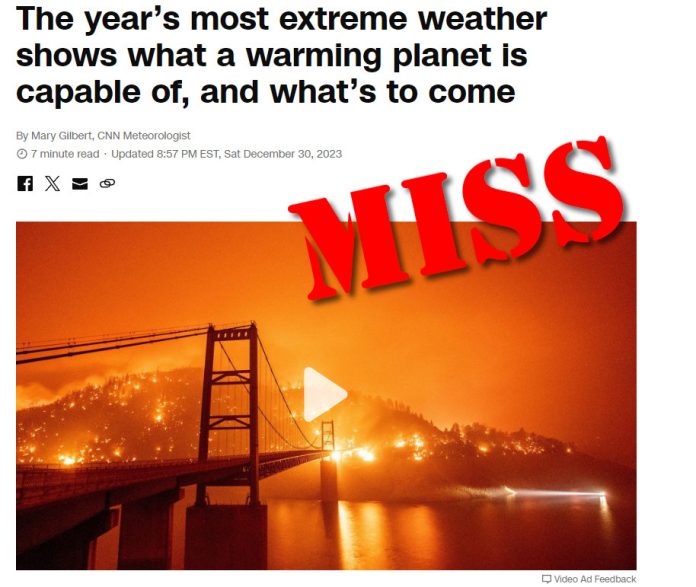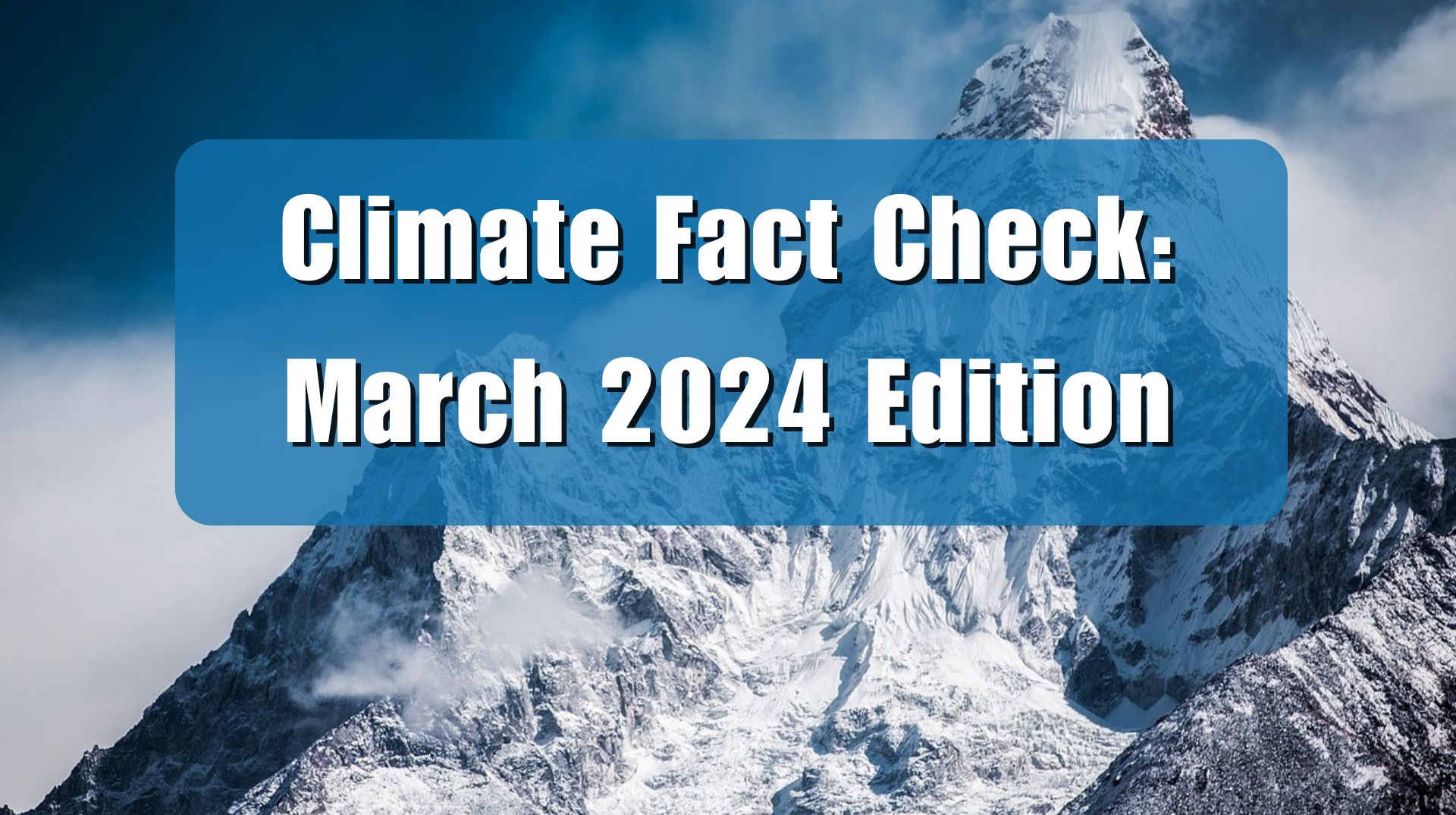CNN recently ran a story, titled “The year’s most extreme weather shows what a warming planet is capable of, and what’s to come.” Real-world data shows that CNN’s “climate change is driving severe weather” claim is false.
CNN’s Mary Gilbert writes:
In the hottest year on record, the fingerprints of a changing climate in a warming world were all over dozens of extreme weather events.
There wouldn’t be weather without heat; heat is energy, and weather is an expression of that energy, of an atmosphere trying to balance itself. But too much heat in the system raises the limits of what is possible in weather and pushes it toward the extremes.
So it’s maybe no surprise then that this year’s record heat was a “through line” in many of 2023’s most brutal weather events, Kristina Dahl, climate scientist with the Union of Concerned Scientists, told CNN.
The “Union of Concerned Scientists,” is nothing more than an advocacy group that is so focused on membership fees, they will even let a dog become a member if the membership fee is paid. As such, Gilbert should not cite claims from that organization as authoritative on climate change.
The article cites no actual data, just anecdotal opinions and news stories about select particular weather events. The article fails to demonstrate any actual data or trends related to long-term climate change.
Concerning hurricanes, Gilbert of CNN writes, “A combined 12 tropical cyclones in the Atlantic and East Pacific basins rapidly intensified in 2023.” So basically she’s reaffirming that hurricanes formed during hurricane season this year. That’s hardly news. A fact further reinforced when you look at long-term hurricane data. 2023 was nothing exceptional, and certainly not a record-breaker according to this National Environmental Satellite, Data, and Information Service report:
The Atlantic basin saw 20 named storms in 2023, which ranks fourth for the most named storms in a season since 1950. Seven of these were hurricanes and three intensified to major hurricanes (Category 3 or higher on the Saffir-Simpson Hurricane Wind Scale). An average season has 14 named storms, seven hurricanes and three major hurricanes.
If climate change was directly fueling hurricanes as CNN claims, in the “hottest year ever” you’d expect there to be a record breaking number and/or intensity. There wasn’t.
The next CNN claim about wildfires is equally unimpressive when you look at the data. CNN notes:
A historic tragedy in a year of unusual wildfire behavior
Unusual wildfire behavior marked the year, both in where fires started and where they didn’t.
Rather than wildfires being record setting during the “hottest year ever,” according to the National Interagency Fire Center, 2023 recorded the fewest acres burned in the US since 1998 with 2,630,119 acres burned. So, if 2023 was noteworthy with regards to wildfires, it was noteworthy for the mild wildfire season.
CNN’s article cites the Maui wildfire as proof of climate change enhancing wildfires. Yet Maui’s climate hasn’t substantially changed in recent years. The wildfire was started by electrical lines arcing in high winds, which could have been prevented. Climate Realism showed that this event had nothing to do with climate change at all and that media outlets linking the event to climate change were knowingly lying.
Next, CNN highlighted Phoenix, Arizona’s summer temperatures to suggest that climate change is causing excessive summer heat:
The hottest month for any US city in a summer of ‘heat hell’
July in Phoenix was the hottest month on record for any US city. The city’s average temperature for the month clocked in at an astonishing 102.7 degrees Fahrenheit following brutally hot days and record-warm nights.
Temperatures from one city in one summer is not indicative of global climate change. Concerning Phoenix, for example, climatologist Roy Spencer, Ph.D., pointed out in this Climate Realism piece, Record Phoenix Warmth Not Reflected in Surrounding Weather Station Data, the Phoenix’s streak of high temperatures was largely attributable to the Urban Heat Island effect. Unalarming data from rural areas abutting Phoenix shows climate change was not a factor in that city.
My colleague Linnea Lueken also pointed out the issue in OilPrice.com Contributor Misses the UHI Influence on Phoenix Warming Trend, saying “Data show that the high levels of warming, especially at night and as measured at an airport, are primarily due to urbanization over time, with the modest warming of the past hundred-plus years playing a very small part in comparison.”
Again, CNN misses the mark by failing to look at actual data.
For their last argument, CNN claimed Supercharged flooding kills thousands, noting:
Storm Daniel brought deadly flooding to Greece, Turkey, and Bulgaria in September before moving over the Mediterranean Sea and taking aim at Libya. Charged by the warm waters of the Mediterranean, Daniel became a “medicane” – a storm with similar characteristics to hurricanes and typhoons.
This one storm was not reflective of long-term trend that could be tied to climate change, despite the implication CNN would have its readers draw. As pointed out in Climate at a Glance: Flooding, The U.N. Intergovernmental Panel on Climate Change (IPCC) reports it has “low confidence” climate change is impacting flooding.
- The U.N. IPCC admits having “low confidence” in even the “sign” of any changes—in other words, it is just as likely that climate change is making floods less frequent and less severe.
- Studies of rivers and streams that have not been altered by human development show very little, if any, increase in flooding events.
- Floods always have and always will occur. With no increase in overall flooding activity, there is no justifiable reason to blame any recent, current, or near-future flooding event on climate change.
It is interesting to note that CNN couldn’t even get their feature image right, it wasn’t from a fire this year. Instead, the photo they used was from the 2020 Bear Fire in California. That’s the Bidwell Bar Highway 162 bridge over Lake Oroville as seen in this stock photo from Getty Images. At a minimum, you’d think if 2023’s weather was so severe, CNN wouldn’t have to reach back to a wildfire three years ago to make that case.
Clearly, when you examine actual real-world data, rather than anecdotal news stories as CNN did, the narrative that the “hottest year ever” drove severe weather collapses entirely. The claim is patently false. CNN’s Mary Gilbert, who is a degreed meteorologist, should know better. Instead, she touted this false story as if it were fact, without any real evidence to back it up.
It is just another shameful example of how CNN puts hyping the so-called human caused climate catastrophe narrative ahead of facts.

















False claims, phony scenarios, rehashed stories, sketchy to selective data evidence, welcome to CNN!!! We know better than to believe their drivel and biased reporting! The only objective thing about their reporting is that it is insulting to the integrity and credibility that they may have ever had!